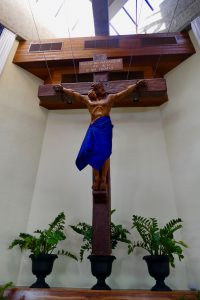HOMILY SUNDAY 22 – A
The Cross is a Blessing
(Jeremiah 20:7-9; Psalm 63; Romans 12:1-2; Matthew 16:21-27)
**********************************************************
“If anyone wants to become my follower, let him deny himself and take up his cross and follow me.”
 The message to us from today’s Gospel is crystal clear: being a believer, a follower of Jesus, is to accept some challenge, some difficulty, some cross to carry on a daily basis.
The message to us from today’s Gospel is crystal clear: being a believer, a follower of Jesus, is to accept some challenge, some difficulty, some cross to carry on a daily basis.
St. Paul puts the same message into different words: “Present your bodies as a living sacrifice. Do not be conformed to this world. Do the will of God.”
When advertisers want to sell a product, they put the best light they can on that product. It seems that Jesus and St. Paul would never make it as advertisers in today’s world, with such an unattractive message, the invitation to take up some cross. So why would they insist on what seems to be such a negative invitation?
Fr. Bertrand Mathieu, a veteran Oblate missionary to the Dené people in northern Saskatchewan, who retired at age 86 and died at age 88, knew the answer. He used to repeat often, to himself and to others that “The cross is a blessing. The cross is a blessing.” He understood the secret of the Paschal Mystery, the underlying secret of the message of today’s readings – that the cross is a blessing. Do we also truly believe, and live, this truth?
In the gospel, we hear Jesus predicting his passion to his followers. As he put it, “he must go to Jerusalem and undergo great suffering, and be killed, and on the third day be raised.” He was trying to help them understand what we call the Paschal Mystery, the pattern by which he would redeem the world.
That pattern begins with the arrest of Jesus in the Garden of Gethsemane, and ends with the pouring out of the Spirit on the disciples at Pentecost. In a sense, it does not end as it is meant to continue with his followers, with the early church, and with us, his followers today.
There are six distinct stages to that pattern: passion, death, resurrection, appearances to the disciples, ascension into heaven, and Pentecost. Jesus suffered; Jesus died, and Jesus rose to new life, the life he wants to share with us. Then he appeared to his disciples as the Risen Lord for over a month, teaching them about this new reign of God, the kingdom of God, that he came to inaugurate.
He was also teaching them to grieve and mourn his loss. They could not have him back the way he was before. He was not just the historical Jesus anymore – he was the risen Lord, returning to his glory with the Father. They had to learn to let him go, let him ascend to the Father, and then they would receive his Spirit to be with them in a new way, at Pentecost.
There are also six stages to our own Paschal Mystery, should we accept the invitation from Jesus to live it. We have all been hurt by others in life, and by life itself. That is inevitable, and that is our passion. Every time we are hurt, however, we also experience loss, loss of relationships, loss of reputation, loss of innocence, of hopes and loved ones. Those are our deaths. But we are still alive. That is our resurrection. However, for many of us, because of our anger from the hurt, and grief from the losses, we are just barely surviving. But God doesn’t want us to be survivors. God wants to set us free to be fully alive and happy.
We have to move on to the appearances, which for us means to learn to grieve and mourn our losses, to name those losses, to feel the sadness and grief involved, to share those powerful emotions with others, to pray about them and to finally accept those losses, let them go and give them to God.
We are also called to experience the ascension in our lives. That happens when we learn to forgive the hurts, to let go of our stored-up anger and resentment, to deal with those dark emotions, to feel them, share them with others, and in that way, forgive and finally give them also to God. That is how we can experience the ascension in our lives.
Now we have room in our hearts to receive the spirit of forgiveness of any hurt, and acceptance of all our losses. We are truly set free, ready to live a new life of peace and joy, the life of Pentecost. We have taken up our crosses, followed Jesus through the Paschal Mystery, and are now living in the reign of God. As St. Paul puts it, our minds and spirits have been transformed.
Now we can be like Jeremiah in the first reading. We have fallen in love with God’s Word. We have experienced the healing power of that Word in our lives, and we now have a desire to proclaim it to others, to share that powerful love with the world, to witness to the healing power of God’s Word.
The Eucharist is itself an experience of the Paschal Mystery of Jesus, making present to us the love that he shared on the cross, the sacrifice of his life, the complete revelation of God’s love for us, leading to new life.
Like Jeremiah, we are then missioned, sent out to proclaim to the whole world, as did Fr. Mathieu, “The Cross is a blessing; the Cross is a blessing.”



